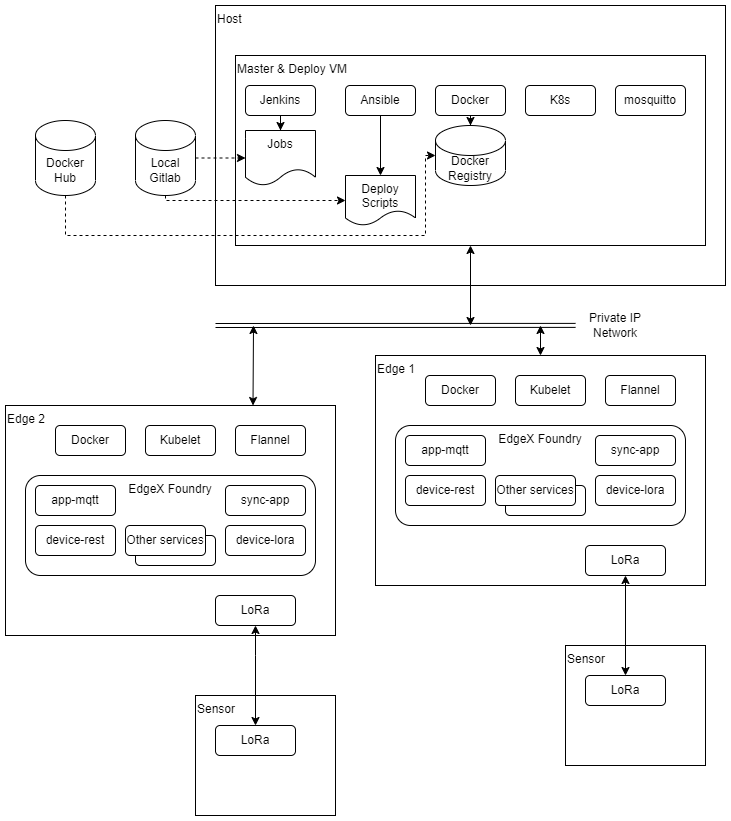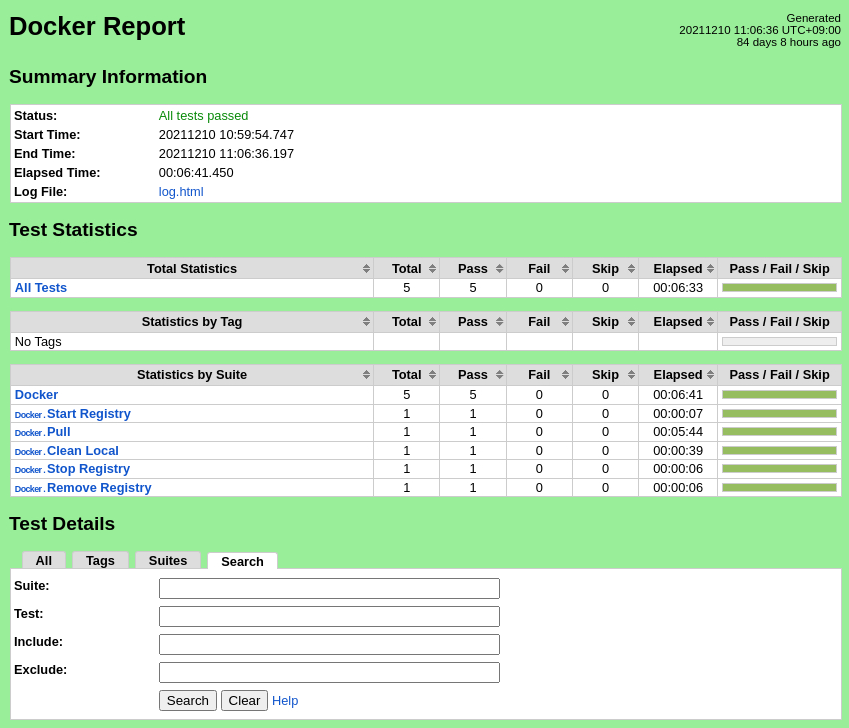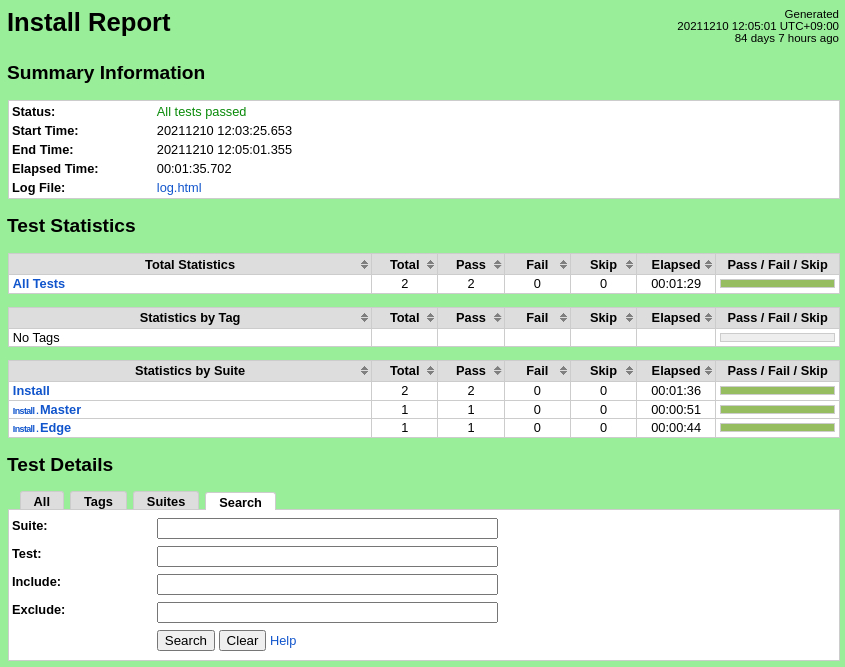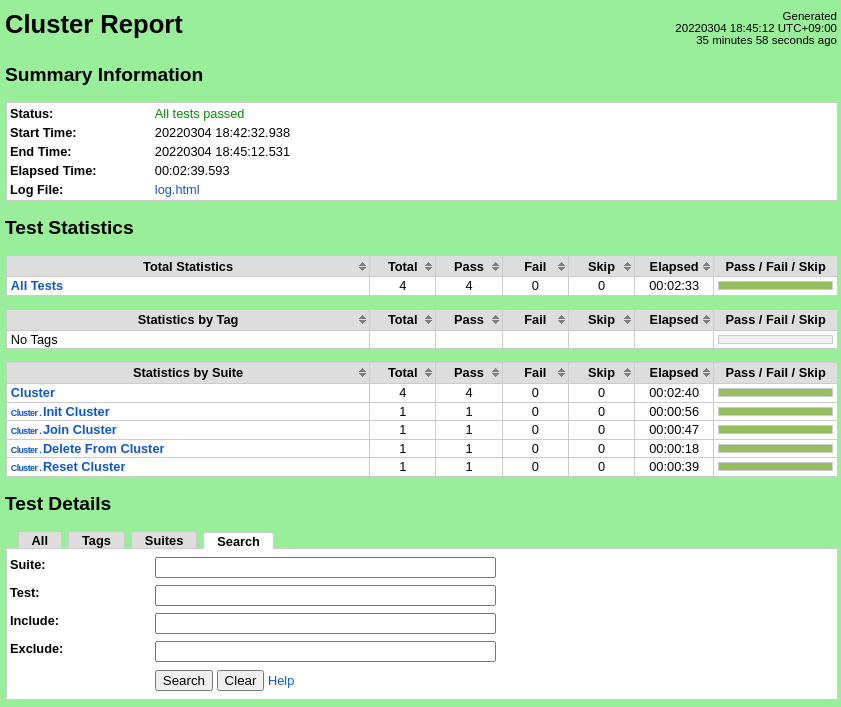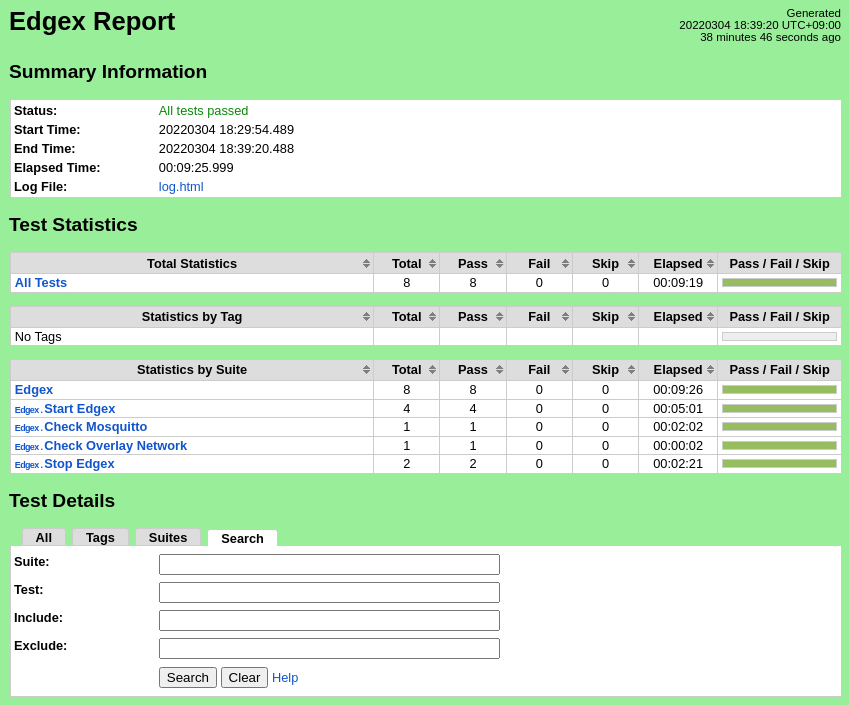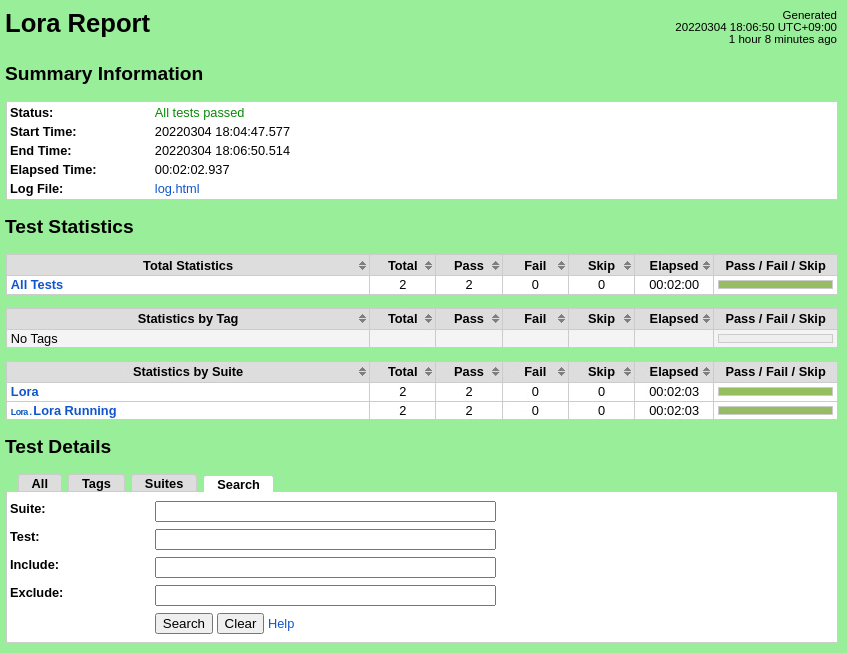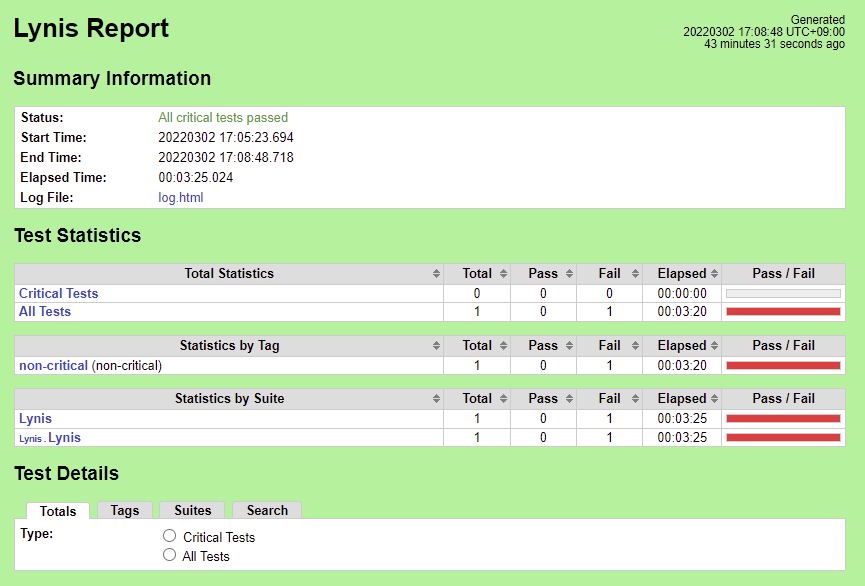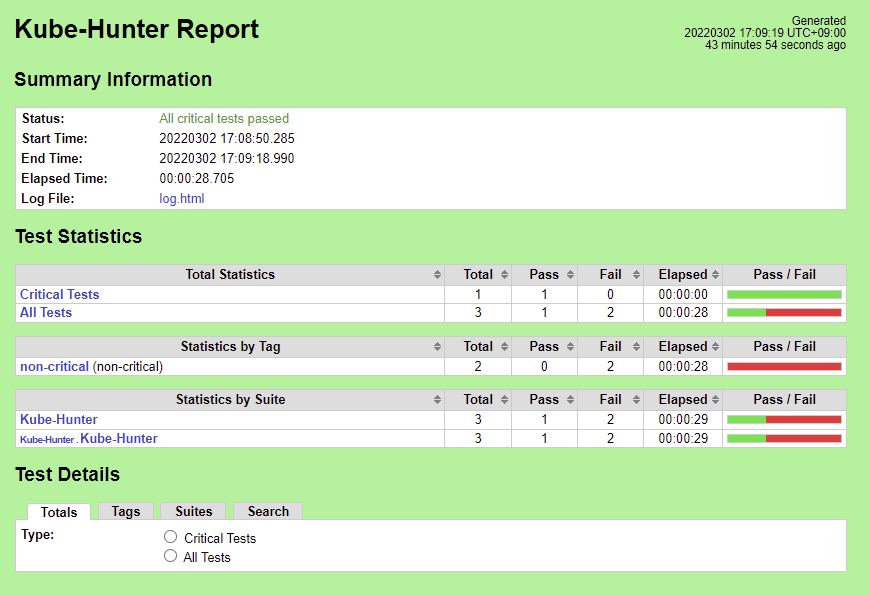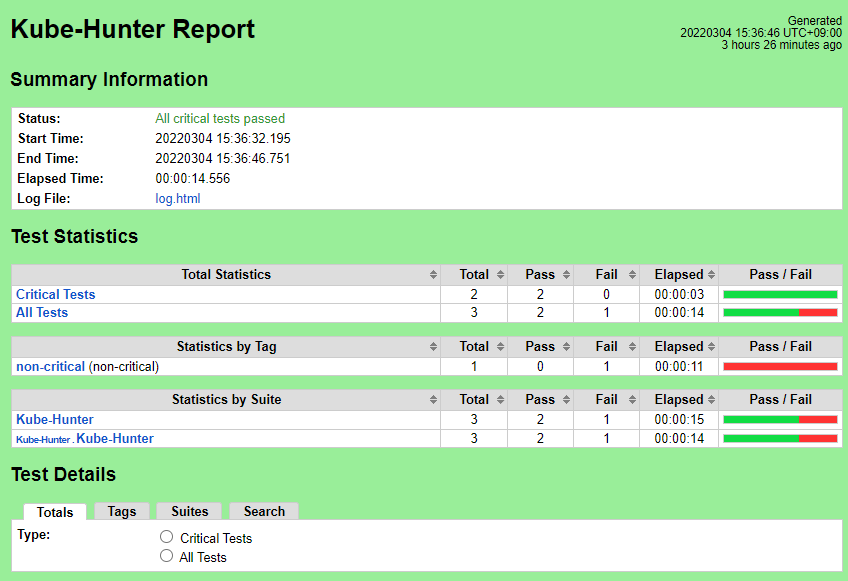Introduction
This document describes the blueprint test environment for the Smart Data Transaction for CPS blueprint. The test results and logs are posted in the Akraino Nexus at the link below:
https://nexus.akraino.org/content/sites/logs/fujitsu/job/sdt/r6/
Akarino Test Group Information
N/A
Testing has been carried out at Fujitsu Limited labs without any Akraino Test Working Group resources.
Overall Test Architecture
Tests are carried out on the architecture shown in the diagram below.
Test Bed
The test bed consists of a VM running on x86 hardware, performing jump host/deploy and master node roles, two edge nodes on ARM64 (Jetson Nano) hardware, and two sensor nodes on ARM32 (Raspberry Pi) hardware.
| Node Type | Count | Hardware | OS |
|---|---|---|---|
| Jump Host, Deploy/Master | 1 | Intel i5, 2 cores VM | Ubuntu 20.04 |
| Edge | 2 | Jetson Nano, ARM Cortex-A57, 4 cores | Ubuntu 20.04 |
| Sensor | 2 | Raspberry Pi 3, ARM Cortex-A53, 4 cores | Rasbian 11.1 |
A second VM is used to run the BluVal test framework components outside the system under test.
Test Framework
BluVal and additional tests are carried out using Robot Framework.
Traffic Generator
N/A
Test API description
CI/CD Regression Tests: Docker Private Registry
This set of test cases confirms the Docker private registry setup, population, and tear-down procedures.
The Test inputs
The test scripts and data are stored in the source repository's cicd/tests/docker directory.
Test Procedure
The test bed is placed in a state with the deploy and master node setup complete, but with Kubernetes, EdgeX, and the private registry not running.
Execute the test scripts:
robot cicd/tests/docker
Expected output
The test script will start the registry, pull upstream images and populate the registry, clean images left over from the pull process, stop the registry, and remove the registry. The robot command should report success for all test cases.
Test Results
Nexus URL: https://nexus.akraino.org/content/sites/logs/fujitsu/job/sdt/r6/lfedge-docker/1/
Pass (5/5 test cases)
CI/CD Regression Tests: Node Setup
This set of test cases confirms the scripting to initialize master and edge nodes.
The Test inputs
The test scripts and data are stored in the source repository's cicd/tests/install directory.
Test Procedure
The test bed is place in a state where only the deploy node is initialized. No EdgeX or Kubernetes services are running. For a complete test, the master and edge nodes should not have any software installed that was not installed as part of the OS installation.
Execute the test scripts:
robot cicd/tests/install
Expected output
The test scripts will initialize the master and edge nodes and verify the required software is installed. The robot command should report success for all test cases.
Test Results
Nexus URL: https://nexus.akraino.org/content/sites/logs/fujitsu/job/sdt/r6/lfedge-install/1/
Pass (2/2 test cases)
CI/CD Regression Tests: Cluster Setup & Teardown
These test cases verify that the Kubernetes cluster can be initialized, edge nodes added to it and removed, and the cluster torn down.
The Test inputs
The test scripts and data are stored in the source repository's cicd/tests/cluster directory.
Test Procedure
The test bed is placed in a state where all nodes are prepared with required software and the Docker registry is running. The registry must be populated with the Kubernetes and Flannel images from upstream.
Execute the test scripts:
robot cicd/tests/clusterExpected output
The test scripts will start the cluster, add all configured edge nodes, remove the edge nodes, and reset the cluster. The robot command should report success for all test cases.
Test Results
Nexus URL: https://nexus.akraino.org/content/sites/logs/fujitsu/job/sdt/r6/lfedge-cluster/7/
Pass (4/4 test cases)
CI/CD Regression Tests: EdgeX Services
These test cases verify that the EdgeX micro-services can be started and that MQTT messages are passed to the master node from the services.
The Test inputs
The test scripts and data are stored in the source repository's cicd/tests/edgex directory.
Test Procedure
The test bed is placed in a state where the cluster is initialized and all edge nodes have joined. The Docker registry and mosquitto MQTT broker must be running on the master node. The registry must be populated with all upstream images and custom images. Either the device-lora service should be enabled with dht2lra service running on the sensor nodes, or device-virtual should be enabled to provide readings.
Execute the test scripts:
robot cicd/tests/edgexExpected output
The test scripts will start the EdgeX micro-services on all edge nodes, confirm that MQTT messages are being delivered from the edge nodes, and stop the EdgeX micro-services. The robot command should report success for all test cases.
Test Results
Nexus URL: https://nexus.akraino.org/content/sites/logs/fujitsu/job/sdt/r6/edgex-install/7/
Pass (8/8 test cases)
CI/CD Regression Tests: LoRa Device Service
These test cases verify that the LoRa device service can read sensor data over the LoRa communications channel.
The Test inputs
The test steps and data are contained in the scripts in the source repository cicd/tests/lora directory.
Test Procedure
The test bed is initialized to the point of having all EdgeX services running, with device-lora enabled.
The dht2lra service is started on the two sensor nodes.
Execute the test scripts:
robot cicd/tests/lora
Expected output
The test cases will check if MQTT messages containing temperature data gathered from the sensor nodes are arriving at the master node on the topic for each each edge node, validating that the LoRa device support is functioning.
The Robot Framework should report success for all test cases.
Test Results
Nexus URL: https://nexus.akraino.org/content/sites/logs/fujitsu/job/sdt/r6/edgex-lora/3/
Pass (2/2 test cases)
Feature Project Tests
N/A
BluVal Tests
BluVal tests for Lynis, Vuls, and Kube-Hunter were executed on the test bed.
The Test inputs
Steps To Implement Security Scan Requirements
https://vuls.io/docs/en/tutorial-docker.html
Test Procedure
- Deploy a Test VM
- Copy the folder ~/.kube from Kubernetes master node to the Test VM
- Create SSH Key to access Kubernetes master node
Vuls
We use Ubuntu 20.04, so we ran Vuls test as follows:
Create directory
$ mkdir ~/vuls $ cd ~/vuls $ mkdir go-cve-dictionary-log goval-dictionary-log gost-log
Fetch NVD
$ docker run --rm -it \ -v $PWD:/go-cve-dictionary \ -v $PWD/go-cve-dictionary-log:/var/log/go-cve-dictionary \ vuls/go-cve-dictionary fetch nvdFetch OVAL
$ docker run --rm -it \ -v $PWD:/goval-dictionary \ -v $PWD/goval-dictionary-log:/var/log/goval-dictionary \ vuls/goval-dictionary fetch ubuntu 16 17 18 19 20Fetch gost
$ docker run --rm -i \ -v $PWD:/gost \ -v $PWD/gost-log:/var/log/gost \ vuls/gost fetch ubuntuCreate config.toml
[servers] [servers.master] host = "192.168.51.22" port = "22" user = "test-user" keyPath = "/root/.ssh/id_rsa" # path to ssh private key in docker
Start vuls container to run tests
$ docker run --rm -it \ -v ~/.ssh:/root/.ssh:ro \ -v $PWD:/vuls \ -v $PWD/vuls-log:/var/log/vuls \ -v /etc/localtime:/etc/localtime:ro \ -v /etc/timezone:/etc/timezone:ro \ vuls/vuls scan \ -config=./config.tomlGet the report
$ docker run --rm -it \ -v ~/.ssh:/root/.ssh:ro \ -v $PWD:/vuls \ -v $PWD/vuls-log:/var/log/vuls \ -v /etc/localtime:/etc/localtime:ro \ vuls/vuls report \ -format-list \ -config=./config.toml
Lynis/Kube-Hunter
Create ~/validation/bluval/bluval-sdtfc.yaml to customize the Test
blueprint: name: sdtfc layers: - os - k8s os: &os - name: lynis what: lynis optional: "False" k8s: &k8s - name: kube-hunter what: kube-hunter optional: "False"Update ~/validation/bluval/volumes.yaml file
volumes: # location of the ssh key to access the cluster ssh_key_dir: local: '/home/ubuntu/.ssh' target: '/root/.ssh' # location of the k8s access files (config file, certificates, keys) kube_config_dir: local: '/home/ubuntu/kube' target: '/root/.kube/' # location of the customized variables.yaml custom_variables_file: local: '/home/ubuntu/validation/tests/variables.yaml' target: '/opt/akraino/validation/tests/variables.yaml' # location of the bluval-<blueprint>.yaml file blueprint_dir: local: '/home/ubuntu/validation/bluval' target: '/opt/akraino/validation/bluval' # location on where to store the results on the local jumpserver results_dir: local: '/home/ubuntu/results' target: '/opt/akraino/results' # location on where to store openrc file openrc: local: '' target: '/root/openrc' # parameters that will be passed to the container at each layer layers: # volumes mounted at all layers; volumes specific for a different layer are below common: - custom_variables_file - blueprint_dir - results_dir hardware: - ssh_key_dir os: - ssh_key_dir networking: - ssh_key_dir docker: - ssh_key_dir k8s: - ssh_key_dir - kube_config_dir k8s_networking: - ssh_key_dir - kube_config_dir openstack: - openrc sds: sdn: vim:Update ~/validation/tests/variables.yaml file
### Input variables cluster's master host host: <IP Address> # cluster's master host address username: <username> # login name to connect to cluster password: <password> # login password to connect to cluster ssh_keyfile: /root/.ssh/id_rsa # Identity file for authentication
Run Blucon
$ bash validation/bluval/blucon.sh sdtfc
Expected output
BluVal tests should report success for all test cases.
Test Results
Vuls results (manual) Nexus URL: https://nexus.akraino.org/content/sites/logs/fujitsu/job/sdt/r6/sdt-vuls/2/
Lynis results (manual) Nexus URL: https://nexus.akraino.org/content/sites/logs/fujitsu/job/sdt/r6/sdt-lynis/3/
Kube-Hunter results Nexus URL: https://nexus.akraino.org/content/sites/logs/fujitsu/job/sdt/r6/sdt-bluval/2/
Vuls
Nexus URL: https://nexus.akraino.org/content/sites/logs/fujitsu/job/sdt/r6/sdt-vuls/2/
There are 17 CVEs with a CVSS score >= 9.0. These are exceptions requested here:
Release 6: Akraino CVE and KHV Vulnerability Exception Request
| CVE-ID | CVSS | NVD | Fix/Notes |
|---|---|---|---|
| CVE-2016-1585 | 9.8 | https://nvd.nist.gov/vuln/detail/CVE-2016-1585 | No fix available |
| CVE-2021-20236 | 9.8 | https://nvd.nist.gov/vuln/detail/CVE-2021-20236 | No fix available (latest release of ZeroMQ for Ubuntu 20.04 is 4.3.2-2ubuntu1) |
| CVE-2021-31870 | 9.8 | https://nvd.nist.gov/vuln/detail/CVE-2021-31870 | No fix available (latest release of klibc for Ubuntu 20.04 is 2.0.7-1ubuntu5) |
| CVE-2021-31872 | 9.8 | https://nvd.nist.gov/vuln/detail/CVE-2021-31872 | No fix available (latest release of klibc for Ubuntu 20.04 is 2.0.7-1ubuntu5) |
| CVE-2021-31873 | 9.8 | https://nvd.nist.gov/vuln/detail/CVE-2021-31873 | No fix available (latest release of klibc for Ubuntu 20.04 is 2.0.7-1ubuntu5) |
| CVE-2021-33574 | 9.8 | https://nvd.nist.gov/vuln/detail/CVE-2021-33574 | Will not be fixed in Ubuntu stable releases |
| CVE-2021-45951 | 9.8 | https://nvd.nist.gov/vuln/detail/CVE-2021-45951 | No fix available (vendor disputed) |
| CVE-2021-45952 | 9.8 | https://nvd.nist.gov/vuln/detail/CVE-2021-45952 | No fix available (vendor disputed) |
| CVE-2021-45953 | 9.8 | https://nvd.nist.gov/vuln/detail/CVE-2021-45953 | No fix available (vendor disputed) |
| CVE-2021-45954 | 9.8 | https://nvd.nist.gov/vuln/detail/CVE-2021-45954 | No fix available (vendor disputed) |
| CVE-2021-45955 | 9.8 | https://nvd.nist.gov/vuln/detail/CVE-2021-45955 | No fix available (vendor disputed) |
| CVE-2021-45956 | 9.8 | https://nvd.nist.gov/vuln/detail/CVE-2021-45956 | No fix available (vendor disputed) |
| CVE-2021-45957 | 9.8 | https://nvd.nist.gov/vuln/detail/CVE-2021-45957 | No fix available (vendor disputed) |
| CVE-2022-23218 | 9.8 | https://nvd.nist.gov/vuln/detail/CVE-2022-23218 | Reported fixed in 2.31-0ubuntu9.7 (installed), but still reported by Vuls |
| CVE-2022-23219 | 9.8 | https://nvd.nist.gov/vuln/detail/CVE-2022-23219 | Reported fixed in 2.31-0ubuntu9.7 (installed), but still reported by Vuls |
| CVE-2016-9180 | 9.1 | https://nvd.nist.gov/vuln/detail/CVE-2016-9180 | No fix available |
| CVE-2021-35942 | 9.1 | https://nvd.nist.gov/vuln/detail/CVE-2021-35942 | Reported fixed in 2.31-0ubuntu9.7 (installed), but still reported by Vuls |
Lynis
Nexus URL (run via Bluval, without fixes): https://nexus.akraino.org/content/sites/logs/fujitsu/job/sdt/r6/sdt-bluval/2/
Nexus URL (manual run, with fixes): https://nexus.akraino.org/content/sites/logs/fujitsu/job/sdt/r6/sdt-lynis/2/
The initial results compare with the Lynis Incubation: PASS/FAIL Criteria, v1.0 as follows.
The Lynis Program Update test MUST pass with no errors.
2022-03-04 15:33:28 Test: Checking for program update...
2022-03-04 15:33:31 Current installed version : 301
2022-03-04 15:33:31 Latest stable version : 307
2022-03-04 15:33:31 Minimum required version : 297
2022-03-04 15:33:31 Result: newer Lynis release available!
2022-03-04 15:33:31 Suggestion: Version of Lynis outdated, consider upgrading to the latest version [test:LYNIS] [details:-] [solution:-]
Fix: Download and run the latest Lynis directly on SUT.
Steps To Implement Security Scan Requirements#InstallandExecute
The following list of tests MUST complete as passing
| No. | Test | Result | Fix |
|---|---|---|---|
| 1 | Test: Checking PASS_MAX_DAYS option in /etc/login.defs | Result: password minimum age is not configured Suggestion: Configure minimum password age in /etc/login.defs [test:AUTH-9286] | Set PASS_MAX_DAYS 180 in /etc/login.defs |
| 2 | Performing test ID AUTH-9328 (Default umask values) | Result: found umask 022, which could be improved Suggestion: Default umask in /etc/login.defs could be more strict like 027 [test:AUTH-9328] | Set UMASK 027 in /etc/login.defs |
| 3 | Performing test ID SSH-7440 (Check OpenSSH option: AllowUsers and AllowGroups) | Result: SSH has no specific user or group limitation. Most likely all valid users can SSH to this machine. Hardening: assigned partial number of hardening points (0 of 1). | Configure AllowUsers in /etc/ssh/sshd_config |
| 4 | Test: checking for file /etc/network/if-up.d/ntpdate | Test: checking for file /etc/network/if-up.d/ntpdate Result: file /etc/network/if-up.d/ntpdate does not exist ... Hardening: assigned maximum number of hardening points for this item (3). | OK |
| 5 | Performing test ID KRNL-6000 (Check sysctl key pairs in scan profile) : Following sub-tests required | N/A | N/A |
| 5a | sysctl key fs.suid_dumpable contains equal expected and current value (0) | Result: sysctl key fs.suid_dumpable has a different value than expected in scan profile. Expected=0, Real=2 | Set recommended value in /etc/sysctl.d/90-lynis-hardening.conf and disable apport in /etc/default/apport |
| 5b | sysctl key kernel.dmesg_restrict contains equal expected and current value (1) | Result: sysctl key kernel.dmesg_restrict has a different value than expected in scan profile. Expected=1, Real=0 | Set recommended value in /etc/sysctl.d/90-lynis-hardening.conf |
| 5c | sysctl key net.ipv4.conf.default.accept_source_route contains equal expected and current value (0) | Result: sysctl key net.ipv4.conf.default.accept_source_route has a different value than expected in scan profile. Expected=0, Real=1 | Set recommended value in /etc/sysctl.d/90-lynis-hardening.conf |
| 6 | Test: Check if one or more compilers can be found on the system | Result: found installed compiler. See top of logfile which compilers have been found or use /usr/bin/grep to filter on 'compiler' Hardening: assigned partial number of hardening points (1 of 3). | Uninstall gcc and remove /usr/bin/as (installed with binutils) |
Results after the above fixes are as follows:
The Lynis Program Update test MUST pass with no errors.
2022-03-07 15:19:07 Test: Checking for program update...
2022-03-07 15:19:10 Current installed version : 308
2022-03-07 15:19:10 Latest stable version : 307
2022-03-07 15:19:10 No Lynis update available.
The following list of tests MUST complete as passing
| No. | Test | Result |
|---|---|---|
| 1 | Test: Checking PASS_MAX_DAYS option in /etc/login.defs | Result: max password age is 180 days |
| 2 | Performing test ID AUTH-9328 (Default umask values) | Result: umask is 027, which is fine |
| 3 | Performing test ID SSH-7440 (Check OpenSSH option: AllowUsers and AllowGroups) | Result: SSH is limited to a specific set of users, which is good |
| 5a | sysctl key fs.suid_dumpable contains equal expected and current value (0) | Result: sysctl key fs.suid_dumpable contains equal expected and current value (0) Hardening: assigned maximum number of hardening points for this item (1). |
| 5b | sysctl key kernel.dmesg_restrict contains equal expected and current value (1) | Result: sysctl key kernel.dmesg_restrict contains equal expected and current value (1) Hardening: assigned maximum number of hardening points for this item (1). |
| 5c | sysctl key net.ipv4.conf.default.accept_source_route contains equal expected and current value (0) | Result: sysctl key net.ipv4.conf.default.accept_source_route contains equal expected and current value (0) Hardening: assigned maximum number of hardening points for this item (1). |
| 6 | Test: Check if one or more compilers can be found on the system | Result: no compilers found |
The post-fix manual logs can be found at https://nexus.akraino.org/content/sites/logs/fujitsu/job/sdt/r6/sdt-lynis/3/.
Kube-Hunter
Nexus URL (with fixes): https://nexus.akraino.org/content/sites/logs/fujitsu/job/sdt/r6/sdt-bluval/2/
There are 5 Vulnerabilities.
- KHV002
- KHV005
- KHV050
- CAP_NET_RAW Enabled
- Access to pod's secrets
Fix for KHV002
$ kubectl replace -f - <<EOF
apiVersion: rbac.authorization.k8s.io/v1
kind: ClusterRole
metadata:
annotations:
rbac.authorization.kubernetes.io/autoupdate: "false"
labels:
kubernetes.io/bootstrapping: rbac-defaults
name: system:public-info-viewer
rules:
- nonResourceURLs:
- /healthz
- /livez
- /readyz
verbs:
- get
EOF
|
Fix for KHV005, KHV050, Access to pod's secrets
$ kubectl replace -f - <<EOF apiVersion: v1 kind: ServiceAccount metadata: name: default namespace: default automountServiceAccountToken: false EOF |
The above fixes are implemented in the Ansible playbook deploy/playbook/init_cluster.yml and configuration file deploy/playbook/k8s/fix.yml
Fix for CAP_NET_RAW Enabled:
Create a PodSecurityPolicy with requiredDropCapabilities: NET_RAW. The policy is shown below. The complete fix is implemented in the Ansible playbook deploy/playbook/init_cluster.yml and configuration files deploy/playbook/k8s/default-psp.yml and deploy/playbook/k8s/system-psp.yml, plus enabling PodSecurityPolicy checking in deploy/playbook/k8s/config.yml.
apiVersion: policy/v1beta1 |
Results after fixes are shown below:
Note that in spite of all Kube-Hunter vulnerabilities being fixed, the results still show one test failure. The "Inside-a-Pod Scanning" test case reports failure, apparently because the log ends with "Kube Hunter couldn't find any clusters" instead of "No vulnerabilities were found." Because vulnerabilities were detected and reported earlier by this test case, and those vulnerabilities are no longer reported, we believe this is a false negative, and may be caused by this issue: https://github.com/aquasecurity/kube-hunter/issues/358
Test Dashboards
Single pane view of how the test score looks like for the Blue print.
| Total Tests | Test Executed | Pass | Fail | In Progress |
|---|---|---|---|---|
| 26 | 26 | 24 | 2 | 0 |
*Vuls is counted as one test case.
*One Kube-Hunter failure is counted as a pass. See above.
Vuls and Lynis test cases are failing, an exception request is filed for Vuls-detected vulnerabilities that cannot be fixed. The Lynis results have been confirmed to pass the Incubation criteria.
Additional Testing
None at this time.
Bottlenecks/Errata
None at this time.
